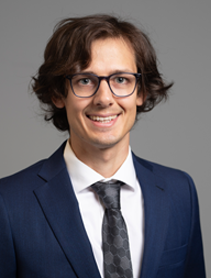
Dr. Jacob S. Tracy
- Position: Assistant Professor
- Department: Chemistry
- Office Location: Building 58, Room 002
- jtracy@uwf.edu
- Campus: 850.474.2948
- Curriculum Vitae (CV)
Biography
Dr. Jacob S. Tracy is an Assistant Professor in the Department of Chemistry. Before joining the faculty at UWF, Dr. Tracy obtained his B.A. in chemistry from Swarthmore College with the highest honors and performed research under the guidance of Robert Paley. Following his undergraduate studies, he continued his exploration of chemistry at Stanford University under the direction of Barry Trost where his doctoral dissertation focused on the catalytic generation and reactivity of metal enolates. While at Stanford, Dr. Tracy took a special interest in mentoring undergraduate students in the research lab, which ultimately resulted in multiple peer-reviewed publications with undergraduate mentees making co-first author contributions.
After earning his Ph.D. in 2020, Dr. Tracy joined the research group of F. Dean Toste at Lawrence Berkeley National Laboratory/UC Berkeley as a postdoctoral scholar. During this time, Dr. Tracy leveraged his synthetic background to design and synthesize redox active organic molecules for use in flow batteries.
After ten years on the West Coast, Dr. Tracy, who grew up in Massachusetts, sought a return east and in 2023 accepted a faculty position in the Chemistry Department at the University of West Florida. While not in the classroom or research laboratory, Dr. Tracy enjoys playing soccer and spending time outdoors while camping, hiking, and fishing.
Degrees & Institutions
- Postdoctoral Scholar, Lawrence Berkeley National Laboratory/University of California, Berkeley (2020-2023)
- Ph.D., Stanford University (2013-2020)
- B.A., Swarthmore College (2009-2013)
Research
1. Using the tools of synthetic and physical organic chemistry, we will develop new redox-active organic molecules for use in battery applications. Specifically, we are interested in developing redox flow batteries, which have the potential to be a transformative grid-scale energy storage technology that enables high levels of renewable energy to be incorporated into the electrical grid. The ultimate goal of this research thrust is to build bench-scale prototype flow batteries that possess high stabilities, energy densities, and voltages. To do so, students will be exposed to laboratory techniques including air-free synthesis, nuclear magnetic resonance (NMR) spectroscopy, cyclic voltammetry (CV), and galvanostatic charge-discharge battery cycling.
2. The incorporation of fluorine into biologically active compounds is a common design element in the fields of medicinal and agricultural chemistry. We will develop new synthetic methodologies to facilitate the synthesis of polyfluorinated molecules. These efforts will include the synthesis of trifluoromethylated heterocycles as well as the development of asymmetric methodologies that create chiral stereogenic centers. The laboratory techniques that students will learn on these projects include air-free synthesis, reaction methodology development, nuclear magnetic resonance (NMR) spectroscopy, infrared (IR) spectroscopy, and chiral high-performance liquid chromatography (HPLC)
Current Courses
- Organic Chemistry I
- Organic Chemistry I Laboratory
- Organic Chemistry II Laboratory
Classes Taught
- Organic Chemistry I
- Organic Chemistry I Laboratory
- Organic Chemistry II
- Organic Chemistry II Laboratory
- Directed Study (CHM 3905)
- Directed Study (CHM 4905)
- Undergraduate Chemistry Research (CHM 4912)


